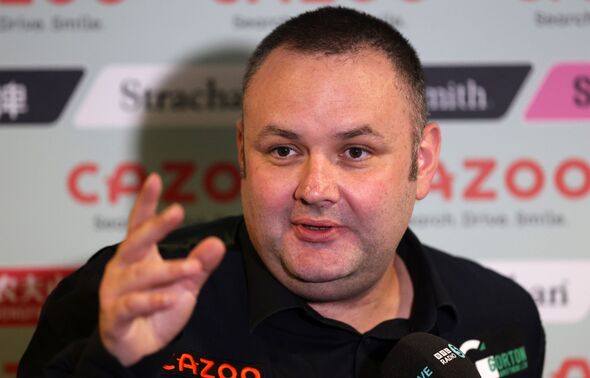
Stephen Maguire Calls for Overhaul of Snooker’s World Ranking System: “It’s Just Not Right Anymore”…
By [snooker insider]
October 23, 2025
Scottish snooker star Stephen Maguire has reignited debate over how the sport’s world rankings are determined, calling for major reform to what he describes as an “outdated and unfair” system. The 43-year-old former UK Champion believes the current prize money–based rankings do not accurately reflect players’ form, consistency, or true standing in the modern game.
Under the current setup, snooker’s world rankings are decided by prize money earned over a two-year rolling period. This means that every pound a player wins in ranking tournaments stays on their total for 24 months before dropping off. For instance, the 2025 World Championship winner collects £500,000 — a sum that will remain on their record until the conclusion of the 2027 World Championship, when it is then subtracted.
While the system was introduced in 2010 to replace the old points-based format, Maguire insists it no longer serves its purpose. He argues that the current model gives an unfair advantage to players with the financial backing or opportunities to enter every event, while penalizing others who play fewer tournaments or suffer temporary dips in form.
> “It’s just not right anymore,” Maguire told reporters after his Northern Ireland Open campaign. “You could have a lad playing the best snooker of his life for six months and still be ranked miles behind someone who had one good run two years ago. That’s not a reflection of who’s performing right now.”
A System Under Scrutiny
The two-year money list has been credited with making the rankings easier for fans to follow — after all, cash is a clear and measurable indicator of success. However, critics like Maguire say it skews the rankings in favor of those who achieve one or two big-money results rather than consistent excellence.
> “Winning the World Championship or the Masters deserves massive rewards — no question,” Maguire continued. “But keeping that money on the list for two years? It’s too long. It means some players are still living off results from two seasons ago, and that doesn’t tell the full story of who’s really on form.”

The 2004 UK Champion believes the current system also makes it difficult for emerging talents to break into the elite ranks. “You can have new players like Si Jiahui, Jackson Page, or Stan Moody putting together good runs and showing huge potential,” he said. “But they’re climbing a mountain to get near the top 16 because of the old money still sitting there from two years back. The system doesn’t reward progression fast enough.”
One-Year List Offers a Glimpse of Fairness
Snooker does operate a one-year ranking list, which only takes into account prize money earned since the start of the current season. This ranking decides qualification for prestigious invitation events — such as the World Grand Prix (top 32), Players Championship (top 16), and Tour Championship (top 12).
Many players, including Maguire, see this list as a more accurate reflection of current form. “That’s the one that makes sense,” he said. “If you’re playing well, you’re in. If you’re not, you’re out. Simple. That’s sport. The one-year list is fair because it’s all about what you’re doing now — not what you did two years ago.”
Indeed, the one-year rankings have produced exciting storylines in recent seasons. Players such as Chris Wakelin, Hossein Vafaei, and Noppon Saengkham have all qualified for big-money events on the back of short bursts of form, even when their two-year ranking positions lagged behind. For Maguire, that proves the system works better when recent performance is prioritized.
A Call for Reform
Maguire’s proposal isn’t entirely new. Several figures within the snooker community — including pundits, fans, and even a few fellow pros — have voiced similar frustrations. Former world champion Shaun Murphy and current top-10 star Kyren Wilson have both hinted that the two-year model can feel “stale” or “misleading.”
> “The sport is so competitive now,” Maguire said. “You’ve got 128 tour players fighting for limited spots, and the margins are tiny. So why not make the rankings reflect what’s actually happening right now on the table?”

He went on to suggest a hybrid approach, combining the stability of the two-year list with the immediacy of the one-year list. “Maybe you keep the big events — the Worlds, the UK, the Masters — counting for longer, but shorten the rest. Or have a rolling system where one year counts full and the next counts half. There’s a balance to be found.”
Impact on Careers and Livelihoods
The ranking system isn’t just about prestige — it directly affects players’ seeding positions, qualification for tournaments, and ultimately, earnings. Falling outside the top 64 at season’s end often means losing a tour card, while dropping out of the top 16 can force a player to qualify for the major events they once entered automatically.
That’s where Maguire feels the greatest injustice lies. “If you’ve had a great year but you’re still ranked low because of results from two years ago, it can cost you thousands in travel, entries, and qualification matches,” he explained. “It’s not just about pride — it’s about people’s livelihoods.”
World Snooker Tour’s Stance
The World Snooker Tour (WST) has long defended the system, arguing that it ensures stability, rewards long-term consistency, and mirrors ranking structures in other sports like tennis and golf. A spokesperson for WST recently reiterated that “the two-year rolling list remains the most balanced and transparent model for global snooker.”
Still, the governing body has shown willingness to tweak systems before — such as when the Home Nations Series and Cazoo events introduced new qualification criteria. With increasing calls for modernization, especially from senior professionals like Maguire, the debate could intensify in the coming seasons.
A Veteran’s Perspective
Maguire, now in his 22nd year as a professional, has experienced both systems — the old points-based era and the current prize money format. His career includes six ranking titles, multiple appearances at the business end of the World Championship, and a reputation for fierce competitiveness.
Yet, as he edges toward the twilight of his career, his focus has shifted toward the sport’s long-term future. “I’ve had my ups and downs, but I love snooker,” he said. “I just want to see it grow and be fair for the next generation. They deserve a system that rewards them for what they’re doing now, not what someone did two years ago.”
The Road Ahead
With snooker continuing to expand globally — new tournaments in Saudi Arabia, China, and Europe, plus growing fan interest through digital platforms — the call for reform may soon reach a tipping point. Whether that means adopting a one-year rolling list, shortening the retention period for ranking money, or introducing weighted averages, remains to be seen.
For Maguire, though, the principle is simple. “Let the rankings tell the truth,” he said firmly. “If you’re the best right now, you should be up there right now. That’s what the fans want to see — and that’s what the sport deserves.”
Leave a Reply